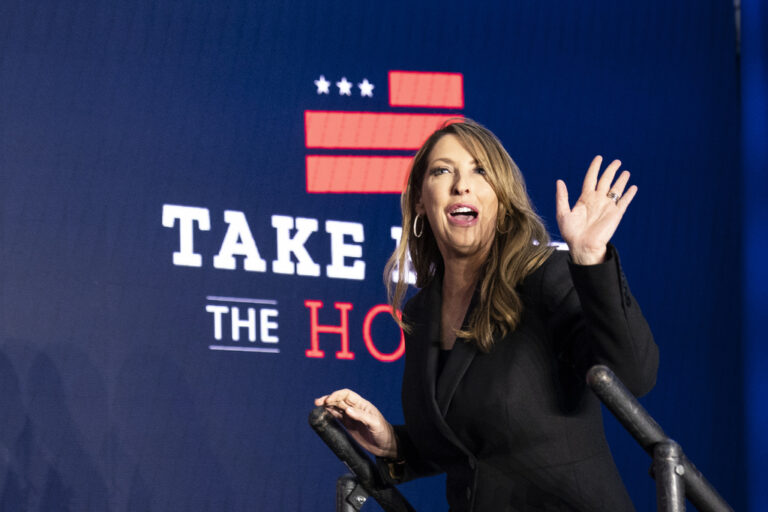Republican National Committee Chair Ronna McDaniel will leave her post on March 8, having been forced out of the GOP’s national leadership as Donald Trump moves toward another presidential nomination and asserts control over the party.
McDaniel announced her decision in a statement on Monday morning.
“I have decided to step aside at our Spring Training on March 8 in Houston to allow our nominee to select a Chair of their choosing,” McDaniel said in the statement. “The RNC has historically undergone change once we have a nominee and it has always been my intention to honor that tradition.”
The move was not a surprise. Trump earlier in the month announced his preference for North Carolina GOP Chair Michael Whatley, a little-known veteran operative focused in recent years on the prospect of voter fraud, to replace McDaniel. Trump also picked his daughter-in-law, Lara Trump, to serve as committee co-chair.
The 50-year-old McDaniel was a strong advocate for the former president and helped reshape the GOP in his image. But Trump’s MAGA movement increasingly blamed McDaniel for the former president’s 2020 loss and the party’s failures to meet expectations in races the last two years.
In addition to McDaniel, RNC co-chair Drew McKissick said he would also leave.
The leadership shakeup comes as the GOP shifts from the primary phase to the general election of the 2024 presidential contest. While former U.N. Ambassador Nikki Haley has remained in the race, Trump has won every state in the primary calendar and could clinch the Republican nomination by mid-March.
Trump cannot make leadership changes without the formal backing of the RNC’s 168-member governing body, but McDaniel had little choice but to acquiesce to Trump’s wishes given his status as the party’s likely presidential nominee and his popularity with party activists. RNC members from across the country are expected to approve Trump’s decision in March.
McDaniel was the the committee’s longest-serving leader since the Civil War. The niece of Utah Sen. Mitt Romney and a former chair of the Michigan GOP, she was Trump’s hand-picked choice to lead the RNC chair shortly after the 2016 election. Her profile as a suburban mother was also considered especially helpful as the party struggled to appeal to suburban women in the Trump era.
McDaniel easily beat back criticism from opponents within the “Make America Great Again” movement to win reelection as party chair a year ago. But her opponents’ voices are carrying more weight. The party is also struggling to raise money. The RNC reported $8.7 million in the bank at the beginning of February compared to the Democratic National Committee’s $24 million.
As Trump’s grip on a third presidential nomination tightens, his allies are moving to direct the party’s resources and activists around his campaign.
Lara Trump has suggested that GOP voters would likely want the RNC to cover her father-in-law’s legal bills given that they see the 91 felony counts against him as an example of political persecution. It’s unclear whether the RNC’s 168 members will eventually agree.
And Trump also wants allies who echo his false theories of voter fraud.
That’s a key reason why Trump is believed to have tapped Whatley, currently the North Carolina GOP chair and general counsel to the RNC.
Trump won North Carolina in 2020 by just over 1 percentage point and the state is expected to be highly competitive again this year.
Whatley has taken credit for hiring an army of lawyers ahead of the 2020 election, which he has said stymied Democratic efforts to commit voter fraud that year. There was no evidence of any intentional efforts to commit widespread voter fraud in multiple investigations and court cases.
Whatley also has strong connections to the political establishment. His resume includes experience as an oil and gas lobbyist and links to establishment figures like George W. Bush and former Sen. Elizabeth Dole, R-N.C.
(AP)











One Response
Risky move buy Trump. McDaniel was well positioned to try to get the 40% of the Republicans who oppose Trump to support the party in November. Even if winning primaries is a function of rallying one’s base, winning elections is a function of expanding the base. While Biden has a similar problem (the “Progressives” (sic) versus the mainstream traditional Democrats, Trump shouldn’t assume his MAGA base, with support from the rest of the Republicans, is enough to win in November.